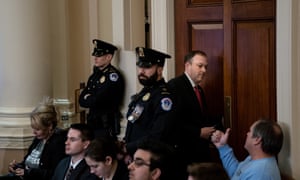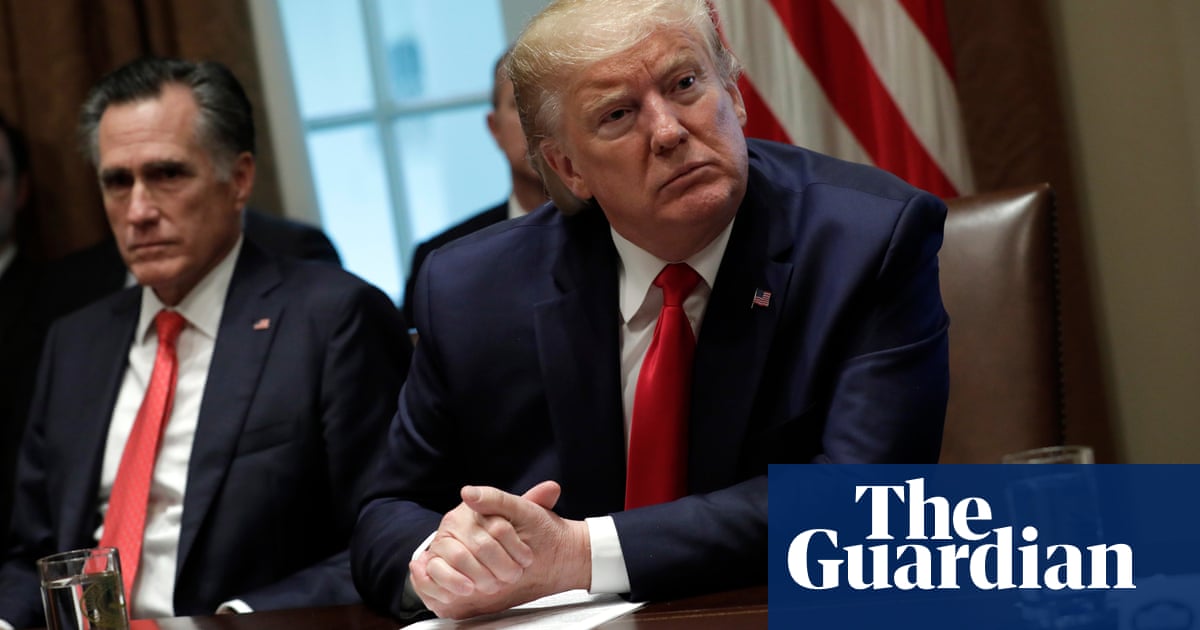Congressional Republicans dug deep in defense of Donald Trump over the weekend, frustrating Democratic hopes that the impeachment inquiry would build bipartisan support following weeks of testimony laying out how Trump attempted to extract a political “favor” from Ukraine in exchange for official acts.
At the same time, the White House said it was preparing for a trial in the Senate. If the House of Representatives votes for impeachment, the matter would move to the upper chamber with Trump’s removal from office on the line.
But that prospect seemed distant as not a single elected Republican stepped forward to criticize Trump and members of Congress dodged the question of whether it was acceptable for a president to seek help from a foreign country with a political campaign.
“Let me answer that,” the New York representative Lee Zeldin said on CNN’s State of the Union on Sunday, before zigging to claim Trump had a bona fide interest in fighting Ukrainian corruption and zagging to point out that Ukrainian president Volodymyr Zelenskiy had been granted a meeting with Trump – at the United Nations.
Other Republicans buttressed Trump’s insistence on a baseless and debunked conspiracy theory that Ukraine, not Russia, was behind 2016 election tampering.
“I don’t know,” Louisiana senator John Kennedy told Fox News Sunday when asked if Russia was behind the interference, as the US intelligence community says. “Nor do you. Nor do any of us.”
And yet, even as Republicans declared “case closed”, potentially damaging information about Trump’s Ukraine scheme continued to emerge. The Washington Post cited three anonymous sources in reporting that an internal White House review had uncovered “extensive efforts to generate an after-the-fact justification” for the decision to withhold military aid for Ukraine.
Trump and his defenders insist that the aid was not held up in an effort to pressure Ukraine into announcing an investigation tied to Joe Biden, despite a previous statement to that effect, soon retracted, by acting chief of staff Mick Mulvaney and despite the testimony of multiple impeachment witnesses.
The ranking Republican on the House intelligence committee, meanwhile, faces allegations he travelled to Europe late last year to meet Ukrainians and discuss digging up dirt on Biden. Devin Nunes has denied the claim and threatened to sue CNN and the Daily Beast, which reported it.
On Sunday Adam Schiff, the chair of the intelligence panel, told CNN if Nunes “was traveling on taxpayer funds to dig up dirt on Biden, that will be an ethics matter, that’s not before our committee”.
Throughout the nine-week impeachment inquiry steered by Schiff, Trump has worked hard to keep Republicans in line, fiercely attacking critics as “human scum” and showering praise and attention on defenders who managed to catch his eye. He also has been inviting lawmakers on exclusive trips to Camp David, the presidential retreat, at taxpayers’ expense, the Post reported.
Elise Stefanik of New York, one of the youngest members of Congress and a rising Republican star, was the beneficiary of an approving Trump tweet on Sunday, as was Jackie Walorski, a member of the House ethics committee from Indiana.
“None of the Republican senators defending Trump could say with a straight face that they would tolerate a Democratic president doing the same thing,” tweeted Walter Shaub, former director of the government ethics office. “But, given this dangerous precedent, they may have no choice if they ever lose control of the Senate. Is that what they want?”
Schiff said the inquiry had amassed “overwhelming” evidence of “serious misconduct” by Trump, but said he would continue to seek documents and potentially take further testimony as the committee assembles a report over the Thanksgiving holiday.
The report will go to the House judiciary committee, which will determine if and on what grounds an impeachment vote will be held.
A Senate trial could offer an opportunity to obtain testimony from witnesses who have not cooperated with the House investigation, including Mulvaney, former national security adviser John Bolton and secretary of state Mike Pompeo, Schiff said.
As presiding judge, supreme court chief justice John Roberts would have the ability to approve subpoenas requested by the House – a legal twist first pointed out on the site Talking Points Memo.

“We may get a quicker ruling from a chief justice in a Senate trial, if it ever came to that, then we would get by going months and months on end litigating the matter,” Schiff told CNN.
Schiff dismissed Republican calls for him to testify in any Senate proceedings about his handling of the whistleblower complaint that sparked the impeachment inquiry.
“There’s nothing for me to testify about,” Schiff said. “And I think, if the president or his allies in the Senate persist in this, it really means they’re not serious about what they’re doing … The only reason for them to go through with this is to mollify the president.”
The White House is preparing for a trial, Trump adviser Kellyanne Conway told CBS’s Face the Nation. But Republican support for the president on the Sunday morning shows was not as full-throated as it might have been. Top officials and the elected party leadership declined to appear to defend Trump, CNN said.
The prospect of a strict party line vote on impeachment, which Democratic leaders had vowed to avoid, would not dissuade investigators, Schiff said.
“At the end of the day, we have to decide what our constitutional duty is, even if our colleagues in the GOP and Congress have decided they’re more committed to the person and the president than their constitutional duty,” Schiff said.
“We’re going to still have to do our duty.”
